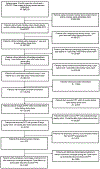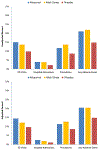Comparison of Empiric Preventative Pharmacologic Therapies on Stone Recurrence Among Patients with Kidney Stone Disease
- PMID: 35545149
- PMCID: PMC9356981
- DOI: 10.1016/j.urology.2022.04.031
Comparison of Empiric Preventative Pharmacologic Therapies on Stone Recurrence Among Patients with Kidney Stone Disease
Abstract
Objective: To compare the frequency of stone-related events among patients receiving thiazides, alkali citrate, and allopurinol without prior 24 h urine testing. It is unknown whether 1 preventative pharmacological therapy (PPT) medication class is more beneficial for reducing kidney stone recurrence when prescribed empirically.
Materials and methods: Using medical claims data from working-age adults with kidney stone disease diagnoses (2008-2018), we identified those prescribed thiazides, alkali citrate, or allopurinol. We excluded those who received 24 h urine testing prior to initiating PPT and those with less than 3 years of follow-up. We fit multivariable regression models to estimate the association between the occurrence of a stone-related event (emergency department visit, hospitalization, or surgery for stones) and PPT medication class.
Results: Our cohort consisted of 1834 (60%), 654 (21%), and 558 (18%) patients empirically prescribed thiazides, alkali citrate, or allopurinol, respectively. After controlling for patient factors including medication adherence and concomitant conditions that increase recurrence risk, the adjusted rate of any stone event was lowest for the thiazide group (14.8%) compared to alkali citrate (20.4%) or allopurinol (20.4%) (each P < .001). Thiazides, compared to allopurinol, were associated with 32% lower odds of a subsequent stone event by 3 years (OR 0.68, 95% CI 0.53-0.88). No such association was observed when comparing alkali citrate to allopurinol (OR 1.00, 95% CI 0.75-1.34).
Conclusion: Empiric PPT with thiazides is associated with significantly lower odds of subsequent stone-related events. When 24 h urine testing is unavailable, thiazides may be preferred over alkali citrate or allopurinol for empiric PPT.
Copyright © 2022 Elsevier Inc. All rights reserved.
Figures
Similar articles
-
Comparison of Selective Versus Empiric Pharmacologic Preventative Therapy With Kidney Stone Recurrence.Urology. 2021 Mar;149:81-88. doi: 10.1016/j.urology.2020.11.054. Epub 2020 Dec 19. Urology. 2021. PMID: 33352163 Free PMC article.
-
Comparison of Class-Specific Side Effects Across Preventative Pharmacologic Therapies for Kidney Stone Disease.Urol Pract. 2024 Jan;11(1):172-178. doi: 10.1097/UPJ.0000000000000470. Epub 2023 Dec 20. Urol Pract. 2024. PMID: 38117963 Free PMC article.
-
Comparison of Selective vs Empiric Pharmacologic Preventive Therapy of Kidney Stone Recurrence With High-Risk Features.Urology. 2022 Jun;164:74-79. doi: 10.1016/j.urology.2021.12.037. Epub 2022 Feb 17. Urology. 2022. PMID: 35182586 Free PMC article.
-
Pharmacologic treatment of kidney stone disease.Urol Clin North Am. 2013 Feb;40(1):21-30. doi: 10.1016/j.ucl.2012.09.013. Urol Clin North Am. 2013. PMID: 23177632 Review.
-
Empiric therapy for kidney stones.Urolithiasis. 2019 Feb;47(1):107-113. doi: 10.1007/s00240-018-1090-6. Epub 2018 Nov 26. Urolithiasis. 2019. PMID: 30478476 Free PMC article. Review.
Cited by
-
Thiazide Use for the Prevention of Recurrent Calcium Kidney Stones.Clin J Am Soc Nephrol. 2023 Dec 14;19(5):653-5. doi: 10.2215/CJN.0000000000000399. Online ahead of print. Clin J Am Soc Nephrol. 2023. PMID: 38099948 Free PMC article. No abstract available.
-
Kidney Stone Prevention.Adv Nutr. 2023 May;14(3):555-569. doi: 10.1016/j.advnut.2023.03.002. Epub 2023 Mar 9. Adv Nutr. 2023. PMID: 36906146 Free PMC article. Review.
References
-
- Qaseem A, Dallas P, Forciea MA, et al.: Dietary and pharmacologic management to prevent recurrent nephrolithiasis in adults: a clinical practice guideline from the American College of Physicians. Ann Intern Med 2014; 161: 659–67. - PubMed
-
- Samson PC, Holt SK, Hsi RS, et al.: The Association Between 24-Hour Urine and Stone Recurrence Among High Risk Kidney Stone Formers: A Population Level Assessment. Urology 2020; 144: 71–76. - PubMed
-
- Nicar MJ, Peterson R and Pak CY: Use of potassium citrate as potassium supplement during thiazide therapy of calcium nephrolithiasis. J Urol 1984; 131: 430–433. - PubMed
-
- Pak CY: Citrate and renal calculi: an update. Miner Electrolyte Metab 1994; 20: 371–377. - PubMed
Publication types
MeSH terms
Substances
Grants and funding
LinkOut - more resources
Full Text Sources



